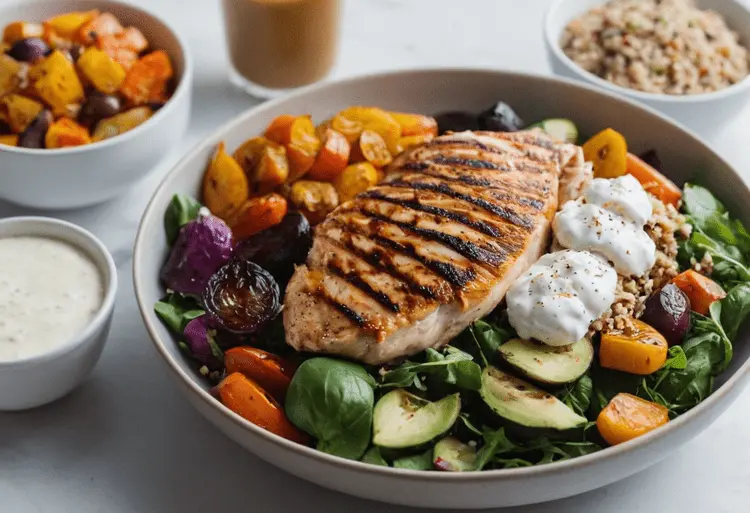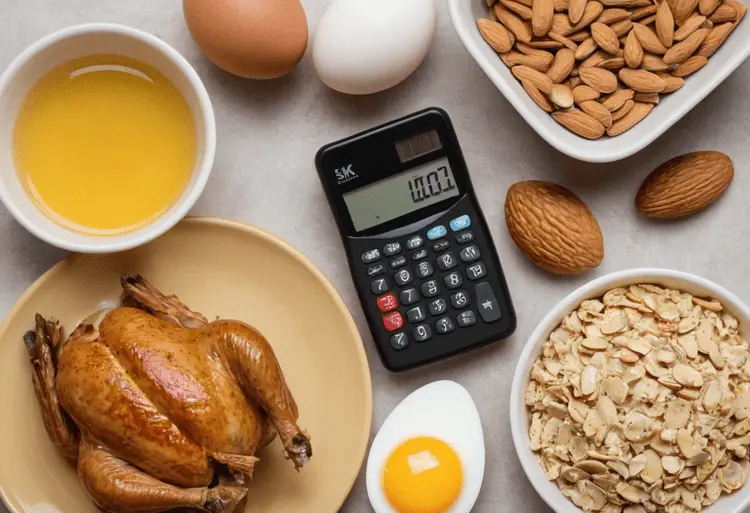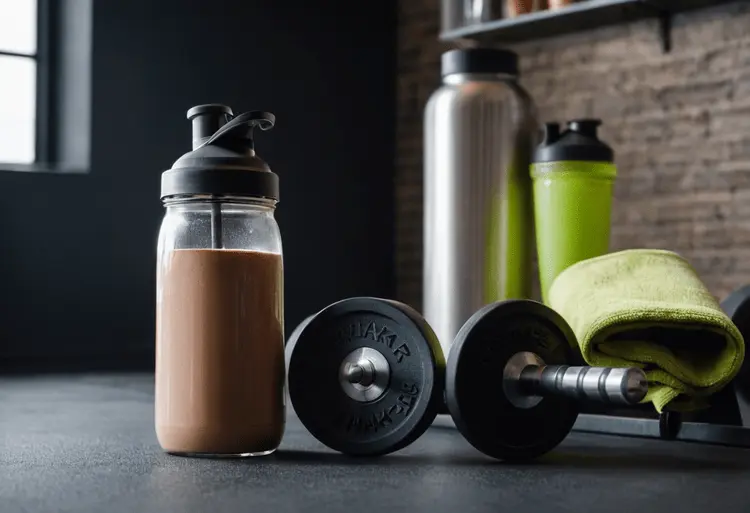A high-protein diet might be the key to unlocking your fitness goals, but navigating the information overload can be a challenge. Are you struggling to figure out how much protein you need, the best food choices, and whether a high-protein approach is right for you?
With so much information out there, it’s easy to feel overwhelmed. How much protein do you really need? What are the best protein-rich foods? Can a high-protein diet truly help you reach your health goals?
This ultimate High-Protein Diet Guide cuts through the confusion! We’ll cover the benefits of protein, help you create delicious high-protein meal plans, and explain how protein supports both weight loss and muscle building.
Get ready to transform your body and feel your best!
High-Protein Diets: The Bottom Line
- High-protein diets aid muscle growth
- Weight loss and increased fullness
- Choose quality protein sources
- Meal plans and recipes provided
- Considerations and safety information
- FAQs address common questions
Table of contents
Introduction

Tired of endless fad diets? Wondering if there’s a way to fuel your body, feel satisfied, and reach your health goals? A high-protein diet might be the answer. But is it just another trend, or is there real science behind it?
Let’s dive in! A high-protein diet emphasizes protein-rich foods. Think lean meats, fish, eggs, legumes – the building blocks for a strong, healthy body. This approach can offer potential benefits like:
- Increased muscle growth and maintenance
- Enhanced weight loss and fat reduction
- Boosted satiety (feeling full) for easier appetite control
However, it’s important to go beyond the hype. A balanced approach is key. That means focusing on high-quality protein sources and including plenty of fruits, vegetables, and healthy fats in your diet. Want an easy way to figure out your protein needs?
Are you ready to explore if a high-protein diet is the right fit for you? Let’s unlock the secrets of protein power together! Let me know in the comments below what your biggest questions are about high-protein diets – I’m here to help!
Think you know all there is about high-protein diets? ‘Unleash Your Beast‘ reveals the secrets, advanced techniques, and expert tips that take results from good…to extraordinary.
The Science Behind High-Protein Diets
Ever wondered why high-protein diets are all the rage? It’s not just hype! Protein plays a superhero role in our bodies, way beyond just building muscle. Let’s break down the science.
How Protein Works in the Body
Think of protein as a string of colorful beads – those beads are amino acids. Your body breaks down those protein “strings” during digestion. Then, it gets to work! These amino acids are used to:
- Build and repair tissues (hello, muscles!)
- Create enzymes that drive essential reactions in your body
- Produce hormones that regulate everything from mood to metabolism
Understanding Protein Requirements
So, everyone needs protein, right? But how much is “enough”, especially on a high-protein diet? Your needs depend on factors like your weight, activity level, and overall health goals.
Potential Benefits of High-Protein Diets
More protein than average can offer some exciting benefits:
- Muscle Power: Want to build strength or preserve muscle as you age? Protein is your best friend.
- Weight Management: Feeling satisfied after meals is key for weight loss or maintenance. Protein boosts satiety, helping you feel fuller for longer.
- Metabolic Boost: Some studies suggest higher protein intake might give a slight nudge to your metabolism.
Best Protein Sources for Your Diet

Ready to power up your high-protein diet? It’s all about choosing the right foods! But with so many options, where do you start? Let’s dive in and discover the best sources to fuel your goals.
Focus on High-Quality Protein Sources
Not all protein is created equal. Prioritize lean proteins – these pack a powerful protein punch with less saturated fat. Also, think complete proteins: they contain all the essential amino acids your body can’t make on its own.
Animal-Based Protein
- Lean Meats: Chicken breast, turkey, and lean cuts of beef are your allies. They’re versatile, tasty, and deliver a hefty dose of protein.
- Fish and Seafood: Think salmon, tuna, shrimp… delicious and excellent sources of omega-3 fatty acids too! A win-win for your high-protein diet and overall health.
- Eggs: Nature’s perfect protein package – affordable and easy to prepare.
- Dairy: Opt for low-fat yogurt and cottage cheese. They offer protein and calcium for strong bones.
Plant-Based Protein
Is a plant-based lifestyle your thing? Don’t worry, you’ve got plenty of delicious high-protein options!
- Beans and Legumes: Lentils, chickpeas, and black beans are protein powerhouses. Plus, they’re packed with fiber.
- Nuts and Seeds: Almonds, chia seeds, and pumpkin seeds make fantastic, protein-rich snacks.
- Tofu and Tempeh: These soy-based products are incredibly versatile and a staple for vegetarian and vegan high-protein diets.
- Quinoa: This ancient grain is a complete protein and offers a satisfying texture.
- Whole Grains: While not as protein-dense as other sources, brown rice or whole-wheat bread can contribute to your overall protein intake.
Remember, a balanced diet is key! Include a variety of protein sources alongside plenty of fruits, vegetables, and healthy fats.
I’m curious – what are your favorite go-to protein sources? Share in the comments below or tag me on social media!
Let’s Talk Quality
Choosing high-quality protein can make all the difference in your high-protein diet journey. Calculate Your Protein Needs to personalize your plan and optimize your results.
Creating a High-Protein Meal Plan
Ready to make those high-protein goals a reality? Let’s transform your diet into a delicious and satisfying plan that fuels your body.
First things first: How much protein do you actually need? Is there a simple way to figure this out? Yes! Use an online protein intake calculator . It’ll help personalize your protein targets based on your individual needs.
Speaking of targets, let’s visualize what a high-protein meal plan looks like. Here are sample plans for different calorie levels to get you inspired:
- 1500 Calorie Plan: Emphasizes lean proteins, fruits, veggies, and whole grains.
- 2000 Calorie Plan: Perfect for active individuals, with satisfying portion sizes.
- 2500+ Calorie Plan: Designed for athletes or highly active people.
Snack time is crucial on a high-protein diet! What are some quick and satisfying high-protein snacks? Here are a few ideas:
- Hard-boiled eggs
- Greek yogurt with berries
- Handful of almonds
A high-protein diet doesn’t mean boring food! Experiment with spices, herbs, and different cooking methods to keep your meals exciting. Variety is key to making this a sustainable lifestyle change.
Let me know – what are your favorite high-protein meals? Or what recipes are you itching to try? Share below, or tag me on social media!
High-protein diets aren’t just about steak and eggs. Discover how protein powders transform smoothies, snacks, and even baked goods – boosting your protein intake in delicious ways!
Tips & Considerations for a High-Protein Diet

Staying Hydrated
Feeling a bit thirsty on your high-protein diet? That’s normal! When your body processes more protein, it needs extra water for the job. So, keep a water bottle handy and sip throughout the day.
Balancing Other Nutrients
Think of your high-protein diet like a team. Sure, protein’s the star player, but it needs support from healthy fats, whole grains, fruits, and veggies. These foods pack in essential vitamins, minerals, and fiber that keep you feeling your best.
Potential Side Effects & Precautions
Starting a high-protein diet might bring some temporary digestive changes. Is a little extra gas or bloating a concern? Ease into increasing your protein intake, drink plenty of fluids, and focus on fiber-rich foods.
Additionally, if you have any existing kidney conditions, it’s crucial to chat with your doctor before making big dietary changes. They’ll help you personalize a plan that’s safe and supports your health.
Is a High-Protein Diet Right for You?
This approach can be incredibly beneficial, but it’s not a one-size-fits-all solution. Consider your goals:
- Building muscle or boosting athletic performance? A high-protein diet could be your sidekick.
- Trying to manage weight? The extra protein might help with feeling full and satisfied.
- Prioritizing overall health? A balanced approach, including protein, is key.
Want to take your protein knowledge to the next level? Check out this helpful Calculate Your Protein Needs
Your High-Protein Diet Questions Answered
Focus on lean meats, poultry, fish, eggs, dairy, beans, lentils, tofu, nuts, and seeds. Whole grains like quinoa also provide protein!
Chicken breast, fish, lean beef, eggs, Greek yogurt, beans, lentils, and tofu are all protein powerhouses.
You’ll likely feel fuller, potentially boost your metabolism, and support muscle building (especially when combined with exercise).
Yes! High-protein foods increase satiety and can aid in weight loss. Remember, overall calorie balance is still important.
Yes! Consistent strength training and adequate protein are key, even if your intake isn’t super high.
Not for most healthy people. If you have kidney concerns, always check with your doctor.
It can help! High-protein diets boost fullness and may support metabolism, but calorie intake still matters.
Absolutely! Focus on lentils, beans, tofu, nuts, seeds, and certain whole grains.
They don’t have to be! Choose budget-friendly options like eggs, beans, canned tuna, and leaner meats.